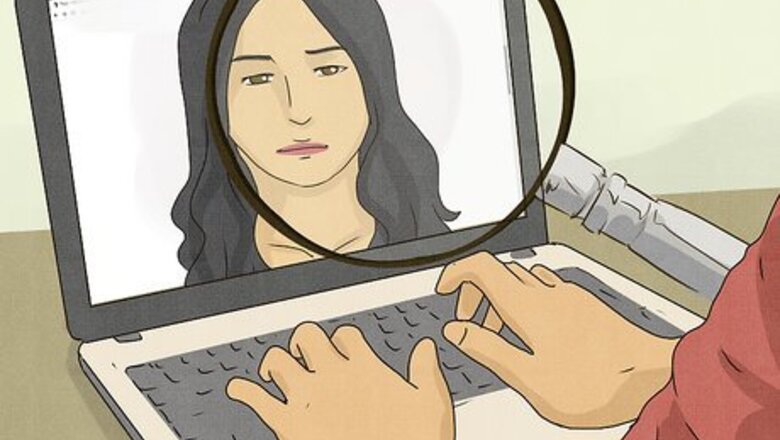
views
Confirm that your partner is a catfish.
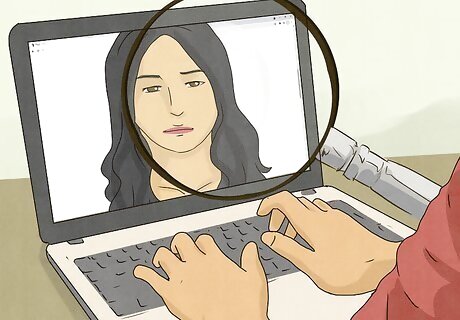
Leave no room for doubt or confusion before you end the relationship. Catfishers often use the same tricks and ruses to manipulate their victims, like using fake, too-good-to-be-true pictures on their dating profiles. An image search can tell you if these pics are originals or copies from somewhere across the web. Here are a few other warning signs that your SO might be a catfish: They want to take your relationship to the next level really quickly. Their profile seems a little too good to be true. They never want to video chat or meet up in person. They don’t seem to exist online when you look them up. They ask you to chat on a more private messaging platform, like email or WhatsApp. They ask you to loan them money.
Confront them to break things off directly.
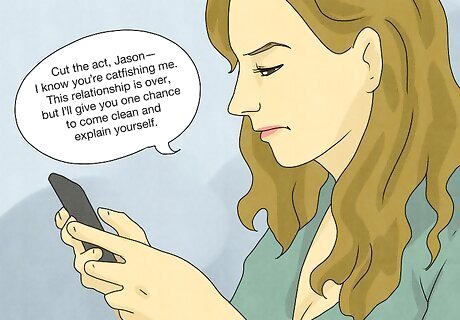
Give yourself and the catfisher an opportunity for closure. Let your catfisher know what you’ve discovered, and that your relationship is over. Explain that you’re hurt and confused by their behavior, and give them a chance to be honest and drop the facade. Even if they refuse to drop the ruse, let them know that they’re out of your life. You might say: “I reverse searched some of your profile pictures and saw that they all came from stock photo websites. I know that you’re catfishing me, and I’m breaking things off. Still, I’d appreciate an explanation as to why you lied to and deceived me for so long.” “Cut the act, Jason—I know you’re catfishing me. This relationship is over, but I’ll give you one chance to come clean and explain yourself.” Confronting your catfisher is a really personal decision, and you definitely don’t have to reach out if you don’t feel comfortable. Remember—they’ve already wasted enough of your time, and you don’t owe them anything!
Break the news to the catfisher’s other contacts.
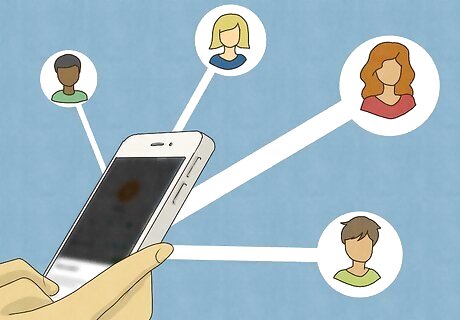
A quick conversation can save someone from a lot of hurt. Before blocking your catfisher on every possible platform, take a look at their friends lists and followers to see if you share any mutual contacts. It could be worth sending a quick warning message to these people to let them know that their “friend” isn’t who they say they are. “Hey Cassie! I saw that you were following the account “itzjamie123xoxo” on Instagram. I recently discovered that they’re a catfisher, and I just wanted to give you a heads up.” “Hi John! Sorry for the random message—I saw that you follow @katie0157543 on Twitter. I just wanted to let you know that she’s a known catfisher, and that you might want to cut ties.” Don’t bother messaging mutual friends that you met through your catfishers. Chances are, they’re in on the scheme already.
Block their phone number and social media accounts.
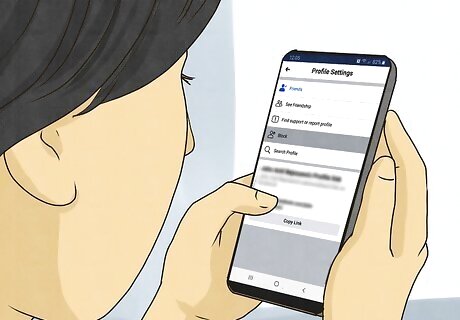
Catfishers are sneaky and may try to contact you after the fact. Think of the different ways you contacted your catfisher over the past few weeks or months. Did you just text each other, or did they add you on multiple social media and messaging platforms? Whatever the case, block the catfisher’s phone number and all of their social media profiles so they can’t get in touch with you. Here’s how you can block them on: Facebook Twitter Snapchat WhatsApp Kik
Block and report their dating profile.
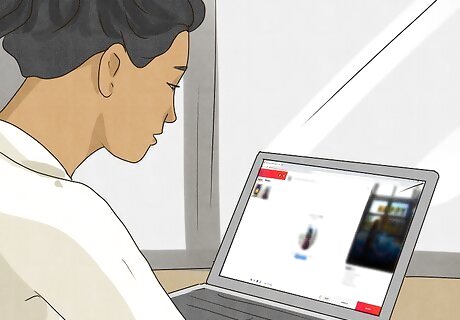
This prevents any other innocent victims from getting catfished. Search in your chat history on the dating app to find the catfisher’s profile. Then, use the app’s built-in safety features to block and report the profile in question. Here’s how: Tinder Bumble Once they’re discovered, a resourceful catfish might slink to the bottom of the dating tank by deleting their dating profiles immediately. If you can’t find their profile, they’ve likely taken it down already.
Switch to a different email address.

Tie up any loose ends that could help the catfisher track you down. A lot of times, catfishers like to take their conversations to a more private platform, like email. If you and your catfisher chatted a lot via email, it might be worth making an entirely new account so they can’t contact you. You could also block the catfisher’s email address if you don’t want to get rid of your old account. Just keep in mind that your catfisher might try to contact you via burner/alternate emails.
Report the catfisher to the authorities.
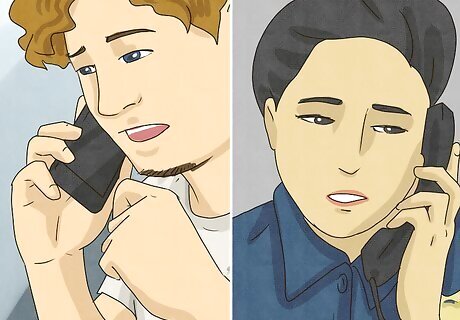
Catfishing isn’t just emotionally hurtful—it’s also illegal. Catfishers often impersonate a living, unsuspecting person to make their ruse more convincing. In other cases, they’ll try to scam money from their online partner. It could be worth bringing your evidence to your local police station and seeing what the authorities say. Going to the police is a very personal decision. Don’t feel obligated to report your experience if you don’t want to!
Delete your online dating profiles.
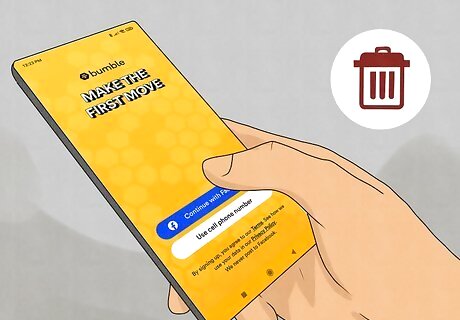
Give yourself some breathing room after ending the catfish relationship. Getting catfished is a majorly hurtful and traumatic experience. Instead of jumping right back into the dating scene, give yourself some time to heal and recover from the toxic relationship by deleting your dating profiles altogether: Tinder Bumble Match.com OkCupid Plenty of Fish You can always delete the dating apps from your phone while still keeping your dating profile live on the site. It’s up to you!
Go easy on yourself.

Remind yourself that you’re the victim and that you have nothing to be ashamed of. It’s totally normal to feel upset, angry, and/or embarrassed after discovering that you were catfished. All of your feelings are valid and understandable—just remind yourself that you aren’t stupid or naive for wanting to find love online. At the end of the day, catfishing is always the fault of the catfisher, not the innocent victim who got caught on their hook.
Practice self-care.

Self-care gives you time to focus on your own needs after a hurtful relationship. Cook yourself a healthy meal, listen to some nice music, buy yourself something that’s been on your wish list for a while, or do some other activity that makes you feel happy and content. Self-care is a great way to remind yourself that you’re important and that your worth is not defined by anyone but yourself. You could: Cuddle with a pet Head out on a day or weekend trip Go for a walk Get a good night’s sleep
Confide in your friends and loved ones.

Friends and family members can help you feel heard during this tough time. Maybe you’re feeling angry that your catfisher so blatantly violated your trust, or hurt that your ex-partner manipulated you in such a despicable way. In any case, your friends and family can provide valuable guidance and help remind you that you’re not alone.
Visit a therapist if you’re struggling.

Your feelings are completely valid, and you don’t have to deal with them by yourself. There’s absolutely nothing wrong or shameful about seeing a therapist; in fact, seeing a therapist is a great way to work through your feelings and heal. A therapist can also help you: Vent your feelings in a healthy way Address your experiences in a safe environment Feel comforted and heard Gain a sense of independence and autonomy over your life



















Comments
0 comment